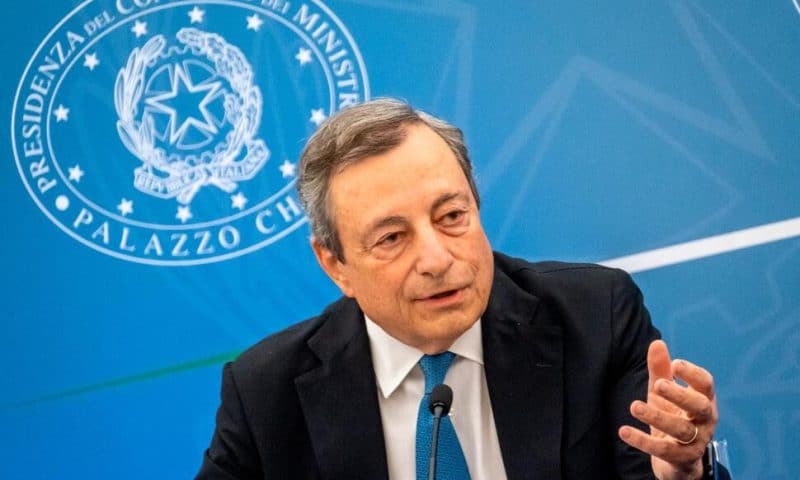Italy is entering five days of political and financial uncertainty after the 5-Star Movement sparked a government crisis by withholding support on a government-sponsored bill.
ROME — Italy entered into days of political and financial uncertainty Friday as political leaders calculated their options and Premier Mario Draghi weighed his after populist ally the 5-Star Movement sparked a crisis by withholding support on a government-sponsored bill.
On the immediate horizon are behind-the-scenes consultations through mid-week to see if Draghi could be persuaded to continue governing with a newly constituted majority — which key parties seem to want — or some other option other than an early election as soon as September.
Draghi immediately offered to resign Thursday after 5-Star senators boycotted a vote on helping Italians cope with rising energy prices, arguing that the conditions that created his national unity government, which included parties on the right, left and the 5-Stars, no longer exist. But President Sergio Mattarella rejected his offer and told Draghi to go back to Parliament on Wednesday to brief lawmakers and offer “an evaluation of the situation.”
Significantly Mattarella didn’t call for a confidence vote. Draghi has been clear that there wouldn’t be a second Draghi government or one without the 5-Stars. The extra days of limbo Mattarella prescribed would allow Draghi at least to have a planned visit to Algeria to finalize key agreements on gas imports.
The turmoil couldn’t have come at a worse time for the eurozone’s third-largest economy. Italy is facing soaring inflation and energy costs as a result of Russia’s war in Ukraine, a prolonged drought that is threatening crops and the ongoing implementation of its EU-financed pandemic recovery program.
While Draghi might still have the support of key allies to continue leading the government, some parties on the far-right and right are already gunning for an early election.
“With Draghi’s resignation, this legislature is over for the Brothers of Italy,” said Georgia Meloni, head of the right-wing party that is polling around 22%, nearly the same as the center-left Democratic Party. “We’ll fight until the Italian people are given back a right that citizens of every other democracy have: the freedom to choose their own representatives.”
She added the hashtag #electionsnow.
Meloni’s usual center-right allies — the Forza Italia party of ex-Premier Silvio Berlusconi and the League led by Matteo Salvini — indicated a wait-and-see approach. In a joint statement Friday, they backed Draghi for what they said was his understandable ire and blasted the 5-Stars for having created a national crisis over their opposition to a new garbage incinerator for Rome.
“I have no words,” Forza Italia’s Antonio Tajani said.
Friday thus opened days of back-room discussions among party leaders to decide what position to take next Wednesday. Already, there were reports that the 5-Stars could vote in favor of a revamped Draghi program, but it’s not clear that other ruling coalition parties would want them back.
Guido Cozzi, professor of macroeconmoics at the University of St. Gallen, said international markets are alarmed at the instability and that Mattarella did well to try to keep Draghi, a former European Central Bank chief, in place since he is seen as a “vital pillar in guaranteeing the stability of Italian public finances.”
“His coalition government was an unprecedented miracle in Italian political history,” Cozzi said. “However, Draghi lacks an independent political force behind him, and his government will always depend on antagonist party leaders.”
The 5-Star Movement, the biggest vote-getter in the 2018 election, has seen its support tank in the ensuing years and would have everything to lose if Italy held an early election. In recent years, it has seen dozens of lawmakers defect, most recently the high-profile foreign minister, Luigi Di Maio, who left with 60 lawmakers to found a new movement.
Giuseppe Conte, the 5-Star leader and former premier, blamed others for forcing the Movement to boycott the confidence motion Thursday on 26 billion euros to help Italians withstand soaring inflation and energy costs. The tipping point, Conte said, was giving Rome’s mayor extraordinary powers to manage the capital’s garbage crisis — powers that Conte bitterly said had been denied the 5-Stars’ Virginia Raggi when she was Rome mayor.
Di Maio blasted Conte’s boycott of the vote a gift to Russia, since the 5-Stars have criticized the Italian government’s military support for Ukraine.
As if on cue, Dmitry Medvedev, the deputy head of Russia’s Security Council headed by President Vladimir Putin, posted pictures Friday of ousted British Prime Minister Boris Johnson and Draghi followed by a black box with a question mark, as if asking “who’s next?”
Medvedev’s social media post followed a stream of comments from other Russian officials who have attributed Johnson’s downfall to his focus on spearheading Western efforts to punish Russia for its invasion of Ukraine.
“My heart weeps seeing Moscow celebrating,” Di Maio told RTL radio. “Medvedev was toasting and was happy because Draghi’s head was served to Putin on a silver platter.”

